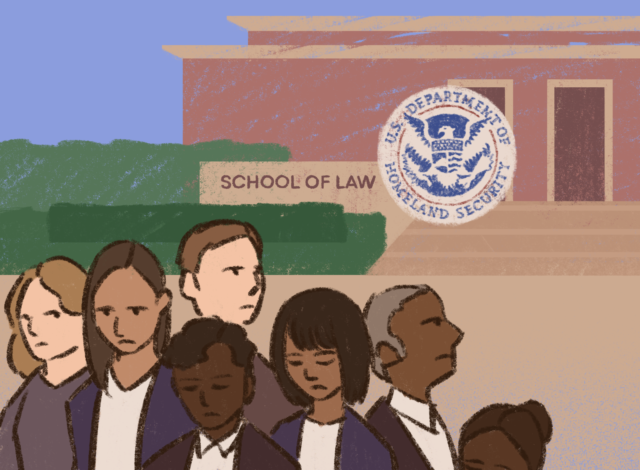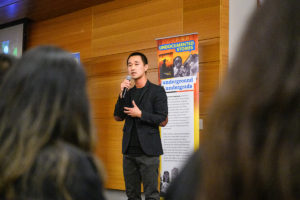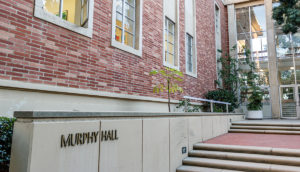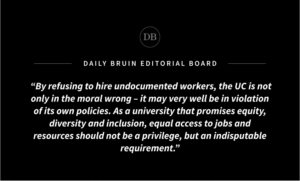This post was last updated Nov. 21 at 5:28 p.m.
Students and faculty members at the UCLA School of Law are debating the extent to which federal immigration agencies should be platformed on campus.
In October, the UCLA Center for Immigration Law and Policy helped launch its newest campaign, Opportunity for All, to protect the right to employment of students without permanent legal status on UC campuses. Twelve students and faculty members wrote a letter to UC President Michael Drake, demanding that the University stop discriminating against students lacking permanent legal status and affirm its commitment to protecting this community.
But some students at the UCLA School of Law said the university’s actions fall flat in their eyes. According to these students, the institution’s relationship with Department of Homeland Security agencies – such as United States Citizenship and Immigration Services, Immigration and Customs Enforcement and Customs and Border Protection – do not align with its stated mission of protecting its students without permanent legal status, pointing to the harm these agencies have caused immigrants.
The Center for Immigration Law and Policy hosted a conversation with U.S. Citizenship and Immigration Services Director Ur Jaddou in August. In response to public criticisms earlier in the year about the agency’s failure to process visa applications in a timely manner, Jaddou eliminated extra interviews and screenings, and her agency extended visa renewal application deadlines in May, according to the Los Angeles Times.
Around a dozen law students staged a walkout at the Center for Immigration Law and Policy’s event. Elaina Vermeulen, a law student who participated in the walkout, said students were protesting in part against these visa backlogs as well as racially biased application procedures for humanitarian parole that favored Ukrainians over Afghans.
“Knowing that you went to (a) law school (that) aligns with USCIS (U.S. Citizenship and Immigration Services) and invites them over – I feel like it’s a little bit of a slap in the face for a lot of folks who … are without authorizations here,” said Jo Zhou, a law student who also walked out.
Students also cited around 14,700 complaints of sexual and physical abuse that were lodged between 2010 and 2016 against ICE officials. They added in a February petition that the U.S. Citizenship and Immigration Services’ relaunch of the Migrant Protection Protocols in December 2021 – which allows U.S. Citizenship and Immigration Services agents to force asylum seekers to wait in Mexico while their immigration proceedings are carried out – violates both federal law and international treaties.
During the August walkout, students left the room in silence, raising signs that read, “Under Biden, USCIS did not increase their asylum grant rate between 2020 and 2021” and “USCIS has failed to grant humanitarian parole to Afghan refugees.”
“(We walked out) to deprive her (Jaddou) of an audience in a way,” Zhou said. “If we bring a lot of folks to the meeting and then walk out – that itself was a statement.”
Their walkout was met with support, including from Ahilan Arulanantham, the conversation’s host and a co-director of the Center for Immigration Law and Policy. Arulanantham, who helped draft a legal brief in support of the Opportunity for All campaign and signed on to the student letter to Drake, said he disagreed with Jaddou’s explanation for some of U.S. Citizenship and Immigration Services’ policies.
“I believe to this day that the government’s differential treatment of those two groups (Ukrainians and Afghans) is more easily explainable as a product of racism than anything else,” they said. “Nothing that she said convinced me that there were actually adequate explanations to capture that differential treatment.”
However, Arulanantham said he does not think shutting out ideologically controversial agencies or officials is the right way to address these concerns.
“I think anytime you can hold a government official position sort of accountable by asking hard questions and forcing them to defend government policy – to me, that is itself a good thing,” they said. “The government itself registers and their staff register … that they have been asked these hard questions and that people are watching what they’re doing.”
While some students were comfortable with Jaddou speaking at the law school, they questioned how much it could accomplish. Josh Behrens, a law student, said though there are many ways to protest against policy, he believes more pressure is needed beyond simple conversations in order to produce real change.
Some students said they saw DHS’s presence at the law school as a long-standing issue that the university needs to grapple with.
Vermeulen said for years, students have been protesting the presence of these agencies at the annual Southern California Public Interest/Public Sector Career Day, a career fair hosted by a consortium of law schools, including the UCLA School of Law, for students seeking careers in public interest law. In 2020, DHS agencies did not participate as a result of community-wide pushback, Behrens said.
Inviting these agencies to campus endangers students without permanent legal status and supports harmful immigration institutions, Vermeulen said.
“It makes no sense that UCLA and other schools in the consortium would want to amplify employment opportunities for these agencies,” she said. “The leadership has shown time and time again … they’re not interested in changing so as to better recognize and uphold the rights of immigrants.”
But faculty members said the law school should not interfere in students’ choice of employment and that students should make their own ideological judgments.
Arulanantham said UCLA has policies to protect students from immigration enforcement officials on campus. Hiroshi Motomura, a professor of law and co-director of the Center for Immigration Law and Policy, said DHS agencies also employ those who help immigrants with difficult circumstances, such as granting green cards.
Ultimately, Motomura said he wants to continue conversations with DHS agencies, not shut them out. With the new Opportunity for All movement, opening up these lines of communication will only increase the chance of the campaign’s success, he added.
“I think we’re also making the judgment that if you engage with them in this way, that creates a possibility of dialogue and change,” he said. “I don’t think of it as making, giving the platform as much as putting them on the spot.”





Comments are closed.